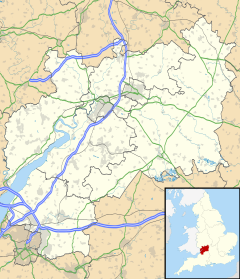Darkhill Ironworks
| Darkhill Ironworks | |
|---|---|

Remains in 2007
|
|
|
|
|
| OS grid reference | SO587085 |
| Coordinates | 51°46′35″N 2°35′44″W / 51.776265°N 2.595434°WCoordinates: 51°46′35″N 2°35′44″W / 51.776265°N 2.595434°W |
|
|
Darkhill Ironworks, and the neighbouring Titanic Steelworks, are internationally important industrial remains associated with the development of the iron and steel industries. Both are scheduled monuments. They are located on the edge of a small hamlet called Gorsty Knoll, just to the west of Parkend, in the Forest of Dean, Gloucestershire. Historically, Darkhill was sometimes written Dark Hill.
The noted Scottish metallurgist, David Mushet, moved to the Forest of Dean in February 1810 to take up full-time management of Whitecliff Ironworks in Coleford - although he quickly disengaged himself from the business for reasons that are not known.
In 1818/19 he built a coke-fired 'experimental furnace' at Darkhill, marking the start of industrial activity on the site. Although he did produce significant quantities of iron for sale, the larger part of the works was given over to research and experimental production.
In 1845 David retired to Monmouth and conveyed Darkhill to his three sons, with the youngest, Robert Mushet, becoming the manager. The sons constantly quarrelled and just six weeks after their father’s death they attempted to sell Darkhill, and other works bequeathed to them, at auction in July 1847. Either there were no takers, or as seems more likely, it was withdrawn from sale. In September 1847 the brothers agreed to dissolve their partnership and the main furnace was probably never again in blast.
Robert, now free of family ties, went into partnership with a Birmingham merchant named Thomas Deykin Clare. Trading as R Mushet & Co., they opened a 'small experimental steelworks' on the upper terrace of Darkhill in 1848, called the Forest Steel Works.
Robert produced some steel here, and some finished tools, but more importantly he made great progress in his experiments with steel alloys and it became clear that a new operation would be required to facilitate production. The alloy for which Robert held most aspiration was one using Titanium; so he named the new company The Titanic Steelworks and Iron Works Co. Ltd., known as The Titanic Steelworks. It opened in October 1862, less than 250 yards from the old works of Darkhill. Three hundred men were employed there, but demand for the new alloys, and profits, did not meet expectations. Robert returned to his experiments and in 1868 he invented 'R Mushet's Special Steel' (R.M.S.).
...
Wikipedia

